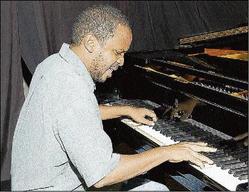
Harold Butler - Colin Hamilton/Freelance Photographer
A 2001 census put Soweto as the most populous black urban residential area in South Africa with 896, 995 people.
The township was based on segregationalist planning.
Over 500 persons were killed by police on June 16, 1976, in what is known as the Soweto Uprising. The date is commemorated as Youth Day in South Africa.
Nelson Mandela was arrested by South African police in 1962. He was released from prison on February 11, 1990.
Apartheid ended in 1991.
Africa Unite: reggae's fight for South Africa.
Pianist Harold Butler recorded the moving instrumental Crying In Soweto in 1978.
Peter Tosh was one of the most vocal opponents of Apartheid. His song, Fight Apartheid, is included on 1987's No Nuclear War, his last studio album.
Bunny Wailer likened South African president P.W. Botha to an insect on 1989's Botha The Mosquito.
Can You, a 1991 hit by Brian and Tony Gold, addressed the oppression of Apartheid.

